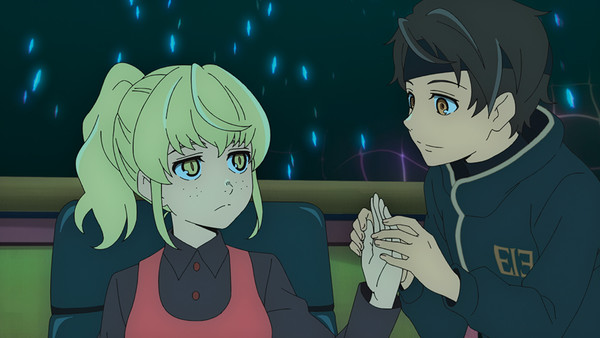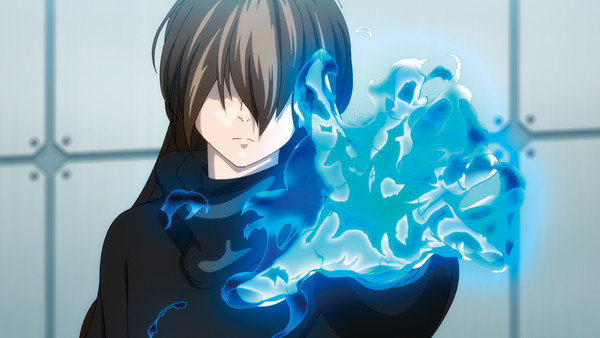
©Tower of God 2 Animations Partners
Everyone climbs the tower with something different in their hearts…
Tower of God Season 2 is here at last!
The view from the top is…
Series Composition/Script: Erika Yoshida
A depiction of real-life problems in our world today
ーSeason 2 is finally here after four years. How do you feel?
Yoshida: Of course, I was elated when I heard a second season had been confirmed. But at the same time, I felt I needed to approach the second season as if it were a different show. When making the first season, we had to ensure that the story had a proper conclusion within a fixed number of episodes for any viewers who weren’t familiar with the original manhwa. Season 2, on the other hand, was made with the intention of continuing on into the future, so the thought process behind its structure was completely different.
ーDifferent in what ways, specifically?
Yoshida: The original manhwa is still ongoing, so you’re reading it without knowing what is foreshadowing only to suddenly connect the dots later on. This aspect makes it incredibly interesting, but it also means we don’t know which bits are foreshadowing or not, so there’s some difficulty in deciding what to include or leave out when it comes to making the anime. I also believe that the author doesn’t want to reveal what will happen later on in the story, so we can’t just decide on our own. We ultimately had to leave everything in while choosing over and over which parts we wanted to emphasize. I really like that style of storytelling from the original manhwa, so I wanted to replicate that in the anime.
ーWhat would you say is the theme that Season 2 hinges upon?
Yoshida: I felt that it was “companionship.”

©Tower of God 2 Animations Partners
ーThe main character Bam did make a lot of companions on his journey in Season 1.
Yoshida: I wanted to make a story that showed who all of the characters would want by their side in their journey and what sorts of things they look for in a companion. Wangnan, who wears Jahad’s ring and is one of the main characters in Season 2, just wants to get to the top and survive. That’s why he has no companions and is willing to use anyone or anything for his goal. I think it will be important to see how his character goes on to change. The other main character, Viole, is harder to read and incredibly strong but likes to work alone. Both Wangnan and Viole come from completely different backgrounds, but they’re both the type not to let others get close to them. The beginning of the story illustrates how they came to be the way they are, but the appeal of Tower of God is really about how all of the characters come from different walks of life and how there is no one right answer.
ーIn an interview during the first season’s broadcast, you said that you felt the original manhwa author SIU was very conscious in his depiction of inequality, and that resonated with you. Would you say it’s the same for Season 2?
Yoshida: Yes, the same goes for Season 2. I strongly sensed the author’s awareness of and opposition toward the issues of academic meritocracy and social inequality. The characters in the story are bound by things over which they have no control, such as their appearance, masculinity and femininity, or the “lucky draw” (though I dislike referring to it this way) of having been born into good parentage or status. I believe that while the story itself looks as if it takes place in a made-up world far from our own reality, it’s actually deeply connected to it.
ーThings that were hinted at in Season 1 have made their way into the foreground.
The first season is told from Bam’s perspective as an outsider who enters the tower, so the story starts with first getting to know the mechanics of the tower and the kind of people that live there. With the second season told through Wangnan’s perspective however, the world of the tower is treated as the norm, which I think really brings out the more grotesque aspects of that world.

©Tower of God 2 Animations Partners
ーHow do you see the main characters Wangnan and Viole?
Yoshida: Wangnan has a pretty cynical view of his situation. We still don’t have the full story of his background, so it’s just my speculation, but I get the sense that he had an especially good upbringing. Like he had a blessed childhood, but there’s something smoldering beneath the surface, and his lack of strength in facing whatever it is head-on has led him to become evasive and cynical. There’s this desperation to cling unconditionally to whatever he can change, swinging between passion and cynicism without ever fully landing on either. That’s why he clings to Viole. Wangnan starts out kind of stuck in the middle like that, which is what makes him appealing in my opinion, while Viole is not only strong but has a clear reason for being that way. Wangnan and Viole aren’t contrasting characters but rather characters who are a blend of similarities in certain respects and complete differences in others. That’s what makes them so interesting.
ーWhat do you feel is the new appeal of Season 2?
Yoshida: I like that everyone has their unique way of being angry. Some of them are quietly angry, and others are angry for vengeance, and so on. It’s the same for all of my other writing so far, but I assert there’s value in getting angry and raising one’s voice. I think you can find more of that in Season 2.
ーPlease give us your final thoughts for our readers.
Yoshida: Tower of God is a very entertaining and appealing series in the way it makes you question things over and over again before coming to a conclusion. I think it’s very valuable to maintain a pace at which the bigger picture can develop slowly over time, rather than each episode being its own complete story. I hope that viewers can enjoy the world of Tower of God and the complex human relationships found in this story. If you could enjoy both the anime and manhwa, I would be very happy.
From Oct 2024, the second season of Tower of God The Workshop Battle is now being distributed on Crunchyroll.
E-Rank Screening Test
Only those who pass the test can become “Regulars” and are qualified to ascend the tower. However one cannot go any further without passing the E-Rank screening test on the 20th floor of the tower. The high increase in difficulty and lofty testing fees make the 20th floor incredibly hard to pass.
This interview was originally published in Newtype‘s August 2024 issue.
Be sure to check out and join Newtype’s Reddit community for discussions and the latest updates!



Leave a Comment